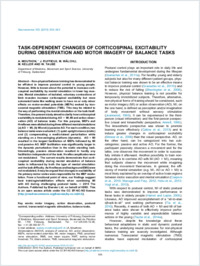Task-dependent changes of corticospinal excitability during observation and motor imagery of balance tasks
- Mouthon, Audrey Department of Medicine, Movement and Sport Science, University of Fribourg, Switzerland
- Ruffieux, Jean Department of Medicine, Movement and Sport Science, University of Fribourg, Switzerland
- Wälchli, Michael Department of Medicine, Movement and Sport Science, University of Fribourg, Switzerland
- Keller, Martin Department of Medicine, Movement and Sport Science, University of Fribourg, Switzerland
- Taube, Wolfgang Department of Medicine, Movement and Sport Science, University of Fribourg, Switzerland
-
10.09.2015
Published in:
- Neuroscience. - 2015, vol. 303, p. 535–543
English
Non-physical balance training has demonstrated to be efficient to improve postural control in young people. However, little is known about the potential to increase corticospinal excitability by mental simulation in lower leg muscles. Mental simulation of isolated, voluntary contractions of limb muscles increase corticospinal excitability but more automated tasks like walking seem to have no or only minor effects on motor-evoked potentials (MEPs) evoked by transcranial magnetic stimulation (TMS). This may be related to the way of performing the mental simulation or the task itself. Therefore, the present study aimed to clarify how corticospinal excitability is modulated during AO + MI, MI and action observation (AO) of balance tasks. For this purpose, MEPs and H-reflexes were elicited during three different mental simulations (a) AO + MI, (b) MI and (c) passive AO. For each condition, two balance tasks were evaluated: (1) quiet upright stance (static) and (2) compensating a medio-lateral perturbation while standing on a free-swinging platform (dynamic).AO + MI resulted in the largest facilitation of MEPs followed by MI and passive AO. MEP facilitation was significantly larger in the dynamic perturbation than in the static standing task. Interestingly, passive observation resulted in hardly any facilitation independent of the task. H-reflex amplitudes were not modulated.The current results demonstrate that corticospinal excitability during mental simulation of balance tasks is influenced by both the type of mental simulation and the task difficulty. As H-reflexes and background EMG were not modulated, it may be argued that changes in excitability of the primary motor cortex were responsible for the MEP modulation. From a functional point of view, our findings suggest best training/rehabilitation effects when combining MI with AO during challenging postural tasks.
- Faculty
- Faculté des sciences et de médecine
- Department
- Département de Médecine
- Language
-
- English
- Classification
- Biological sciences
- License
-
License undefined
- Identifiers
-
- RERO DOC 257271
- DOI 10.1016/j.neuroscience.2015.07.031
- Persistent URL
- https://folia.unifr.ch/unifr/documents/304579
Statistics
Document views: 112
File downloads:
- pdf: 216
